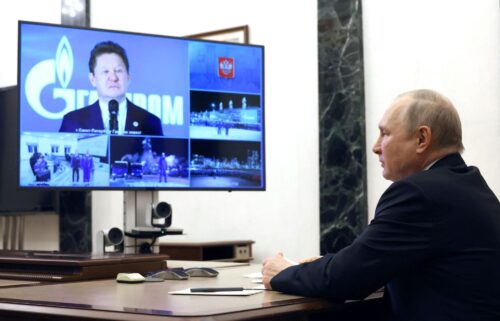Putin threatens potential nuclear escalation; Beijing’s public response muted
Putin doubles down on the war despite disastrous setbacks, threatens nuclear response to loss of claimed territory, and says, “This is not a bluff.”

Vladimir Putin’s invasion of Ukraine is going poorly, but he is doubling and tripling down on the conflict. Despite the Kremlin’s hopes that its “special military operation” would achieve its objectives in a matter of weeks, or even days, Ukrainian military forces — backed by the West — have put up a stout resistance, and are even advancing toward pre-February lines of actual control. A successful Ukrainian push to the status quo antebellum would not only represent a severe geopolitical blow to Putin, but also shake the foundations of his domestic regime.
Facing a potential military defeat, Putin issued a quasi-mobilization order, drafting up to 300,000 Russians to enter the armed forces (a Russian newspaper says a classified version of the order will allow up to 1 million draftees). He also implemented a “stop loss” program that will extend service times by preventing volunteers from leaving the military, a particularly important measure that will boost Russia’s military manpower in the near term.
Western military experts are extremely skeptical that Russian forces will be able to complete adequate training, considering that tanks abandoned by Russian troops are spotted and equipment shortages mount. Still, the mobilization order will raise Russia’s conventional military capacity over the next year, even if its new soldiers are ill trained, ill equipped, poorly led, and likely to suffer high casualty rates.
Meanwhile, Putin issued an unsubtle nuclear threat to Ukraine and its NATO backers: “In the event of a threat to the territorial integrity of our country and to defend Russia and our people, we will certainly make use of all weapon systems available to us. This is not a bluff.” He paired this provocative statement with a promise to hold accession “referendums” in four territories, which would give him a pretext to extend Russia’s nuclear umbrella deep into Ukrainian territory, and even potentially deploy tactical nuclear weapons against Ukrainian targets.
Moscow seems extremely unlikely to employ nuclear weapons in the near future. Throughout the conflict, U.S. intelligence has demonstrated that it has excellent insight into Russian capabilities and intentions; the removal of tactical nuclear weapons from storage is reportedly neither quick nor covert; Moscow would face thorny targeting problems; and NATO and/or the United States might extend a nuclear umbrella to Ukraine, which could deter a potential attack. Still, Putin’s nuclear saber rattling is extremely concerning.
What does Beijing think?
China is largely reacting to Putin’s nuclear threats (at least publicly) by burying its head in the sand. At Tuesday’s press conference, the MFA spokesperson only called on Chinese state media outlets, in an apparent attempt to avoid uncomfortable Russia-related questions. On Wednesday, the MFA issued bromides about “find[ing] a solution that accommodates all parties’ legitimate security concerns.”
During a Thursday meeting between Josep Borrell, the EU’s High Representative and Vice President, and PRC Foreign Minister Wáng Yì 王毅, the two sides “reaffirmed their joint commitment to non-proliferation and opposition to use of WMDs under any circumstance,” at least according to the European readout.
In the Chinese readout, however, Beijing noted that the EU — and not China — “is deeply concerned about the possibility of nuclear proliferation.” This is a reference to Tehran, which is a proliferation threat, as opposed to Moscow, which is threatening to employ nuclear weapons rather than proliferate them. The Chinese-language readout does not contain a reference to opposition to the use of weapons of mass destruction (WMDs).
The Chinese and Russian foreign ministers also shook hands at the UN General Assembly in New York, while Wang Yi said the two sides should “deepen strategic coordination and advance high-quality practical cooperation,” and mentioned that “two sides exchanged views on the Ukraine issue.”
As of yet, there is little to suggest that Beijing will depart from its current path of rhetorical support for Moscow and overall compliance with Western sanctions. However, there are growing signs, including at the Shanghai Cooperation Organization (SCO) meeting in Samarkand last week, that the PRC and other countries are increasingly irritated with the war and its economic dislocations.
Because China has never recognized Russia’s Crimea claims, it’s highly unlikely that Beijing will recognize any territory that Moscow annexes in eastern Ukraine.
Central Asia: Moscow recedes, Beijing rises
Russian influence in Central Asia is eroding by the day. Uzbekistan warned its citizens (many of whom are economic migrants in Russia) to avoid the military draft, while Kyrgyzstan told its citizens to contact the embassy if they receive draft notices. Their open defiance of Moscow, while not without precedent, is noteworthy.
China, Kyrgyzstan, and Uzbekistan completed a section of the railway that will enable rapid shipments to Afghanistan. Due to Moscow’s missteps, Beijing is, somewhat ambivalently and by default, rising in Central Asia and cementing its regional dominance.






